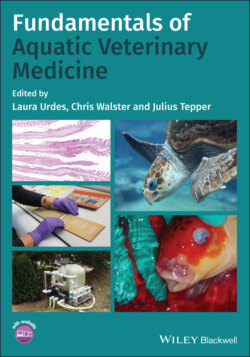Читать книгу Fundamentals of Aquatic Veterinary Medicine - Группа авторов - Страница 29
1.3.2.2 Temperature
ОглавлениеFish are ectotherms, which means that they do not regulate their body temperature internally so it fluctuates with external environmental changes. Sudden change often causes stress and sometimes even death in extreme situations. Temperature affects the development and growth of fish more than any other single factor and also influences other variables. Metabolic rate either increases or decreases two‐fold for every 8°C. Each species has an optimal temperature range for growth and reproduction. Cultured species should be selected according to the prevailing water temperature in each locality. This is because the temperature range at which an organism can survive depends on their temperature adaptation pattern over time.
Water temperature greatly influences water quality, because the growth and metabolism of phytoplankton, bacteria and other microorganisms increases with increasing temperature. Moreover, water holds less oxygen at higher temperatures. Dissolved oxygen depletion is much more likely to occur during hot weather than during cooler periods. Rates of chemical processes such as ionization, mineral dissolution, adsorption and ion exchange also increase in response to higher water temperature. The onset of potentially harmful water quality events is faster in warmer weather. A deep pond can also be subject to thermal stratification, with large temperature fluctuations among layers of the water column.
Warm‐water species grow best above 21°C
Cold‐water species grow best below 21°C
Cool‐water species grow best at mid‐range from 21°C to 28°C
Sudden temperature changes cause stress and even death.
